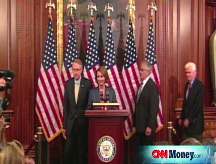Golden parachutes here to stay
Advocates of financial rescue trumpet end to big exit packages for execs. But many leaving troubled firms that get help will still get to take a bundle with them.
NEW YORK (CNNMoney.com) -- Many advocates of the proposed $700 billion bailout of Wall Street trumpet its limitations on large pay packages and so-called golden parachutes for some of the top executives at the troubled firms that will get help.
Barack Obama and John McCain, in endorsing the rescue plan, pointed to the restrictions on Wall Street pay. And the curbs were a key point stressed by congressional leaders on both sides of the aisle when they spoke about the deal Sunday.
"This is the first time in the history of United States that anything has been done by Congress to curtail excessive CEO compensation," said House Financial Services Chairman Barney Frank, D-Mass, on Sunday. "It's not everything we'd like, but it's a very good beginning."
But those hoping for an end to golden parachutes - the large pay packages that top executives get when they leave a company - may end up disappointed.
The ability of Wall Street executives to continue to get large severance payments is one of the reasons Rep. Peter DeFazio, D-Ore., said he would oppose the bailout bill.
"The golden parachutes have been exchanged for camouflage parachutes," DeFazio said during floor debate Monday. "The execs on Wall Street will still get millions. Look at the loopholes there."
Under the bill, Wall Street executives who already have golden parachutes are likely to keep them even if their companies get government help.
"We're not abrogating contracts," said a Treasury official who briefed reporters Sunday.
Another Treasury official said that even future golden parachutes could be paid as long as they're triggered by the sale of a company and not by involuntary termination or corporate failure.
"Our key focus is that we do not want to reward poor performance," he said.
Most firms getting help will sell mortgage-backed securities to the government through an auction. Treasury Secretary Henry Paulson and Federal Reserve Chairman Ben Bernanke have stressed that it's important to get as many firms as possible to participate. And imposing tougher rules on golden parachutes could keep some firms from joining the auctions, according to Treasury officials.
Some firms facing more severe problems are likely to sell assets directly to the government. Treasury is more likely to be tougher on golden parachutes for those firms, according to the Treasury officials.
Nell Minow, the co-founder of the Corporate Library, a research firm that has pushed for greater shareholder limits on executive pay, said golden parachutes in these cases could end up helping taxpayers.
"Golden parachutes, when done right, are there to align the interest of the executives and the investors," Minow said. She said they make executives less worried about losing their jobs and more willing to pursue sales that can benefit investors.
And in the case of firms in the bailout, she said, "the investors are the taxpayers."
While she would like to see still stricter limits on CEO pay in the firms that are being bailed out, she's encouraged by some other restrictions in the bill that aren't getting as much attention as golden parachutes. One is the so-called clawback provision that would force executives to give up past bonuses and incentives when their companies restate past financial results that had earned them that pay.
"The clawback provisions are very strong," she said.
Minow said she's still hopeful that Treasury will impose even stricter restrictions on golden parachutes and pay as it implements the program and starts to interact with the firms on a case-by-case basis.
And even if the bill doesn't rid Wall Street of golden parachutes, Minow sees it as a good first step toward larger changes down the road. ![]()


